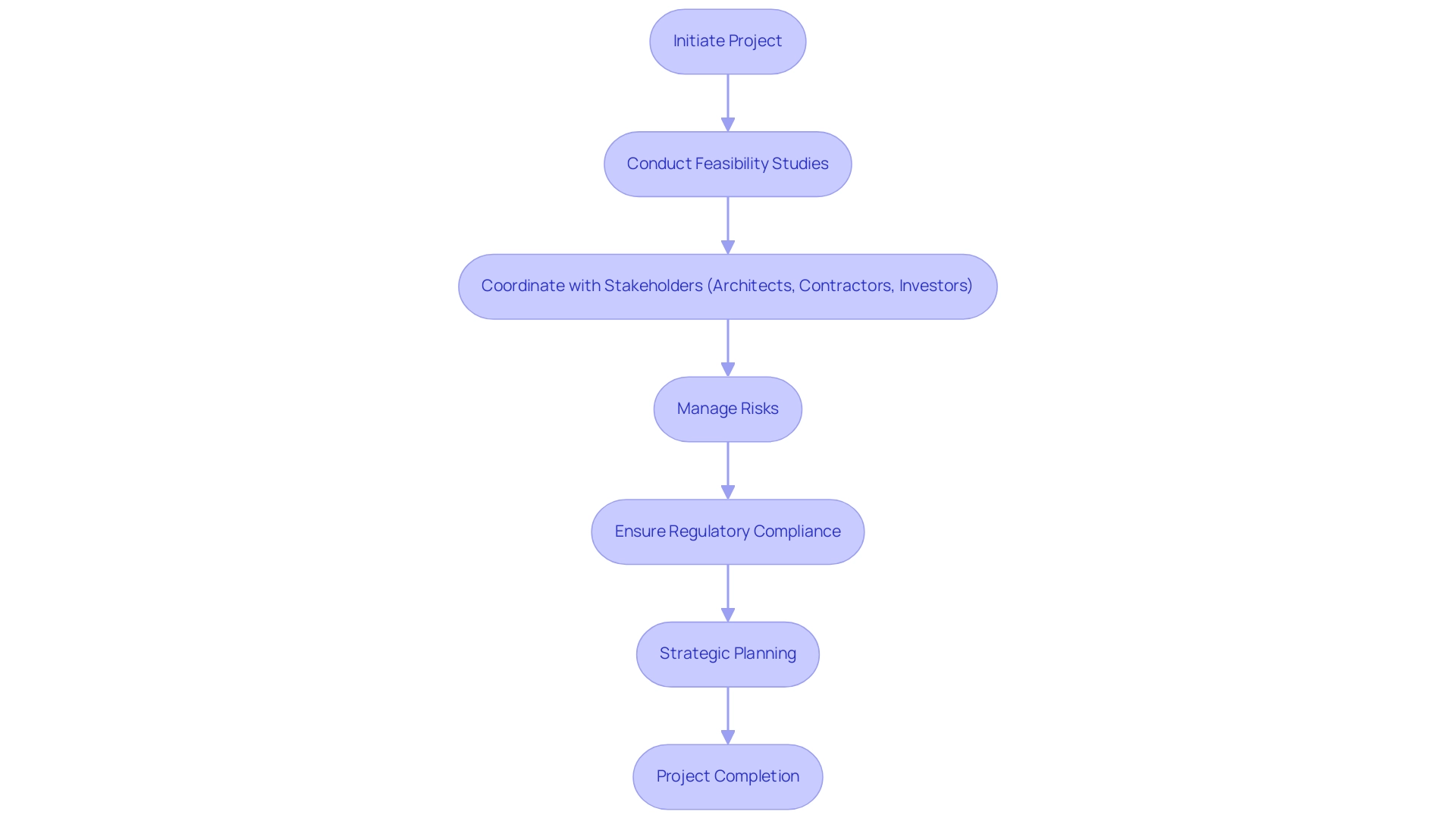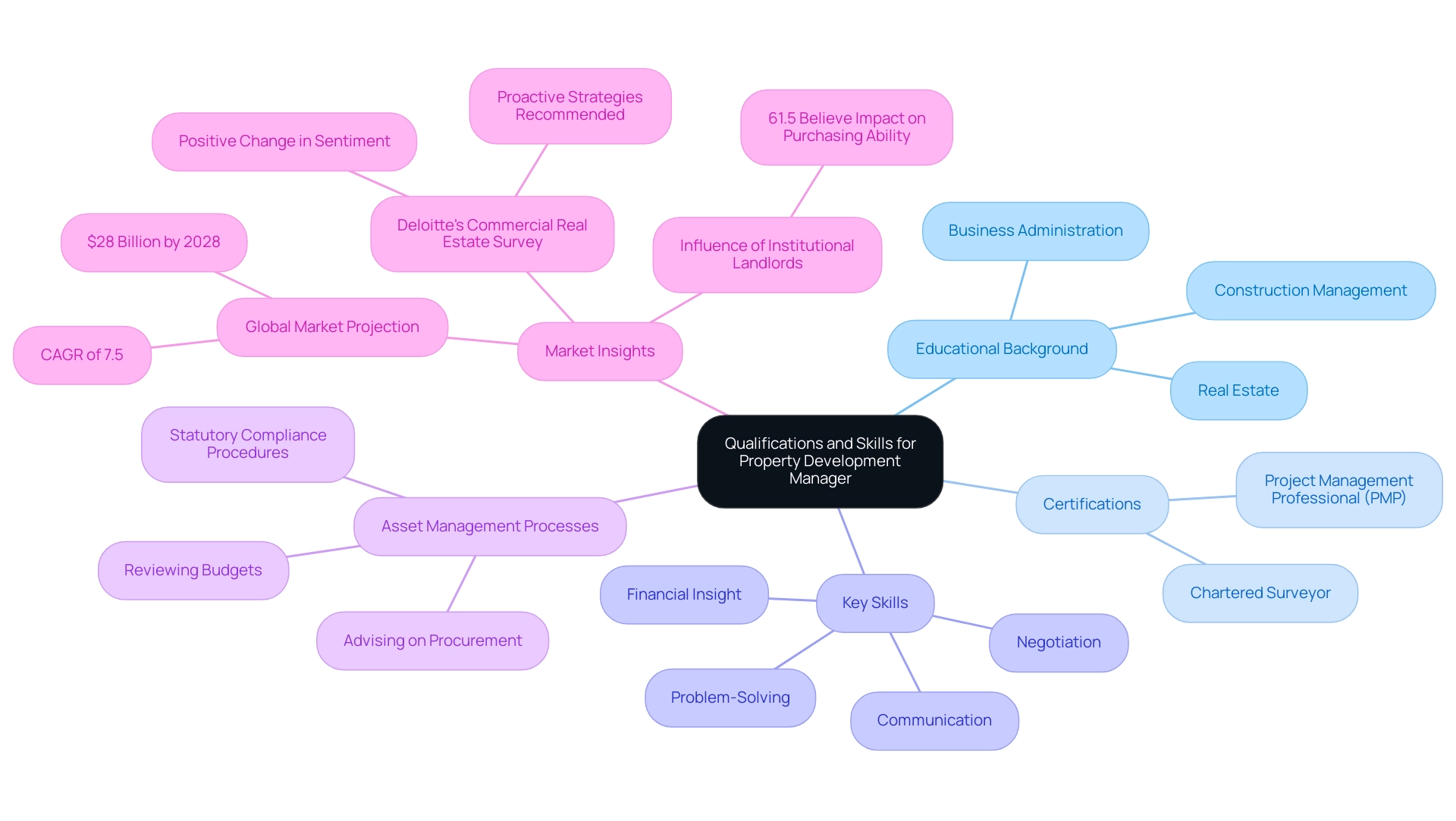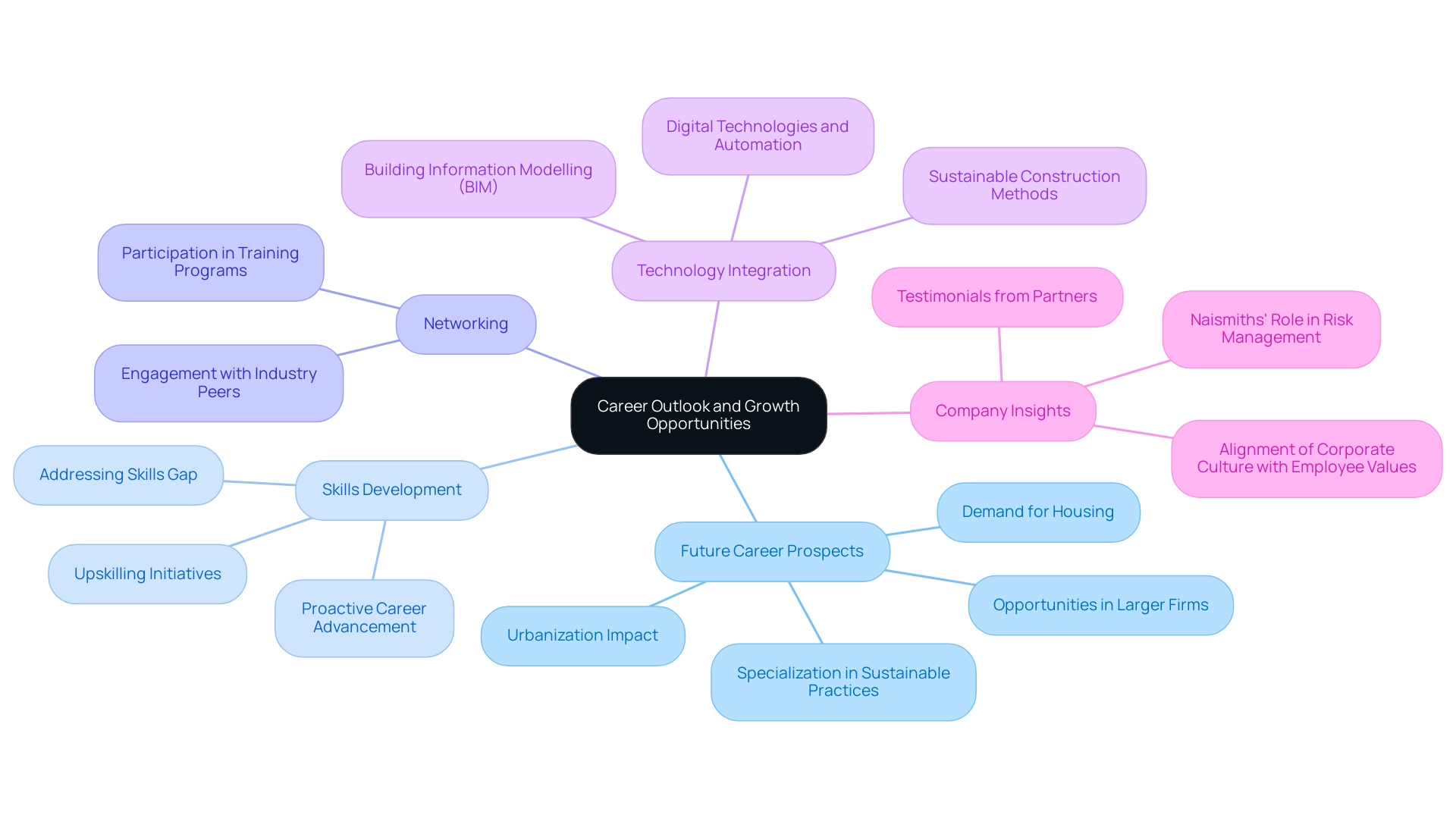
Overview
In the realm of real estate, a property development manager plays a pivotal role in overseeing projects, coordinating diverse stakeholders, managing risks, and ensuring compliance. This function is essential for delivering successful outcomes within budgetary constraints and timelines.
As we approach 2025, the significance of this role becomes increasingly pronounced, particularly as managers navigate complex projects and ambitious sustainability goals. The article illustrates how these professionals directly influence project success and uphold quality standards. Their expertise is not just beneficial; it is imperative in a rapidly evolving market.
Introduction
In the dynamic realm of real estate, the role of a property development manager stands as a cornerstone for successful project execution. As landscapes evolve and the demand for innovative housing solutions surges, these professionals are tasked with overseeing the intricate lifecycle of development projects. From coordinating diverse stakeholders to ensuring compliance with stringent regulations, their multifaceted responsibilities are crucial in navigating the complexities of the industry.
Furthermore, with an increasing emphasis on sustainability and advanced technologies, the significance of property development managers is more pronounced than ever. This highlights their essential role in driving project success and fostering collaborative environments. As the landscape of property development continues to shift, understanding the nuances of this pivotal role becomes imperative for anyone looking to thrive in the industry.
Defining the Role of a Property Development Manager
A property development manager plays a crucial role in overseeing the entire lifecycle of real estate initiatives, from initial feasibility studies to final completion. This role necessitates the coordination of various stakeholders, including architects, contractors, and investors, ensuring that endeavours are delivered on time, within budget, and to the highest quality standards. Serving as a vital connection among stakeholders, the role enhances communication and alignment with the initiative’s objectives, nurturing a cooperative atmosphere essential for achievement.
Key duties of a property development manager encompass risk management, adherence to regulations, and strategic planning focused on optimising the initiative’s financial potential. This highlights the pressing need for skilled professionals capable of navigating complex landscapes.
Successful real estate oversight is exemplified through case studies, Naismiths’ comprehensive building consultancy services, including tailored solutions for management, compliance, risk mitigation, contract administration, and technical due diligence, contribute to successful outcomes. Furthermore, with only 1% of buildings undergoing deep energy retrofits annually, a significant 76% of global survey respondents plan to undertake such renovations in the next 12 to 18 months, driven by regulatory pressures and an increasing emphasis on sustainability.
Naismiths’ initiative services are essential in supporting these efforts, ensuring that endeavours not only adhere to emerging standards but also improve energy efficiency and asset value. The current role of property development managers in 2025 is increasingly important, as they are responsible for ensuring that initiatives not only achieve immediate targets but also align with long-term sustainability goals. Industry leaders, stress that efficient real estate management, which a development manager embodies, is synonymous with risk management and cooperation, ensuring that all parties attain optimal results while upholding high-quality standards throughout each initiative.
This collaborative spirit is essential in a landscape where the stakes are high, and the margin for error is slim.

Essential Qualifications and Skills for Success
To thrive as a development manager in 2025, candidates typically require a bachelor’s degree in fields such as real estate, construction management, or surveying. The competitive landscape of real estate growth necessitates relevant certifications—such as Project Management Professional (PMP) or Chartered Surveyor status—essential for establishing credibility and showcasing expertise as a property development manager.
Key skills for success in this role include strong communication and negotiation abilities, crucial for cultivating relationships with stakeholders and managing intricate dynamics. Financial insight is equally vital, as property development managers must evaluate budgets, forecasts, and financial statements to ensure endeavours remain feasible and profitable.
A thorough comprehension of construction methods and regulations is indispensable for property development managers, enabling efficient supervision of initiatives and adherence to industry standards. This is particularly significant in the context of asset management in construction, where overseeing and monitoring assets—from workforce to machinery—is essential for success. Naismiths’ data-first, commercially focused approach guarantees that each element of the property lifecycle is meticulously planned and controlled to the highest industry standards.
In project management, specific processes such as reviewing budgets, advising on procurement, and considering statutory compliance procedures are crucial. Naismiths’ surveyors play a pivotal role in this regard, ensuring full compliance and that construction work is on track and delivered to a high quality through regular site visits. They anticipate and address any issues that arise, submitting regular reports to provide a clear overview of progress. Furthermore, problem-solving abilities are essential for managing challenges that emerge during the process, while the capacity to handle multiple tasks simultaneously is required for maintaining progress amidst competing priorities.
Naismiths emphasises risk management and a collaborative spirit, ensuring that all parties achieve the best possible outcomes while upholding high-quality standards throughout each project.
Statistics indicate that the real estate management market is projected to reach £28 billion by 2028, with a compound annual growth rate (CAGR) of 7.5%. This growth underscores the increasing demand for experienced development managers who can adapt to changing market conditions and deliver successful project results. Moreover, 61.5% of individuals believe that institutional landlords will influence buying capacity, highlighting the challenges real estate developers face in navigating market dynamics.
Insights from industry specialists emphasise the importance of certifications in enhancing the success of real estate developers. A recent survey by Deloitte revealed a positive shift in sentiment among C-level executives regarding the commercial real estate sector, suggesting that proactive strategies and well-qualified leaders will be pivotal in capitalising on anticipated revenue growth and transaction activity. As the sector evolves, the qualifications and skills of successful property development managers will continue to play a crucial role in shaping the future of real estate advancement.

Daily Responsibilities and Work Environment
An ordinary day for a development manager encompasses a blend of office duties and on-site activities. Tasked with holding meetings with stakeholders, reviewing plans, and ensuring compliance with local regulations, property development managers allocate a considerable portion of their time—approximately 30%—to site visits. These visits are vital for monitoring progress and addressing emerging issues directly.
This hands-on approach is crucial for effective management in construction, ensuring that all facets of the project align with strategic goals.
Daily responsibilities also involve:
- Analysing budgets
- Preparing detailed reports
- Navigating the complexities of the development process
The work environment is often fast-paced, demanding a high degree of adaptability as managers must respond swiftly to changing circumstances and stakeholder needs. Effective time management and organisational skills are imperative for property development managers to balance the diverse demands of their role, especially during the pre-contract phase, where goal-setting, budgeting, procurement, and compliance are critical.
Case studies exemplify the daily tasks of a property development manager, illustrating their capacity to cultivate strong working relationships through thorough analysis and timely reporting.
This dedication to professionalism not only bolsters project execution but also fosters a supportive work environment that encourages teamwork and effective communication among all parties involved.
Career Outlook and Growth Opportunities
The career prospects for development managers in 2025 are robust, driven by rising urbanisation and an increasing demand for housing. As cities evolve, the necessity for skilled development managers capable of navigating the complexities of property creation becomes paramount. Opportunities for advancement are particularly promising within larger firms or through specialisation in critical areas such as sustainable practices and commercial real estate.
Networking and continuous professional development are essential for career progression in this field. Engaging with industry peers and participating in relevant training programmes allows managers to remain informed about the latest trends and best practices. Notably, the integration of advanced technologies, including building information modelling (BIM) and sustainable construction methods, is reshaping the real estate landscape.
Addressing the skills gap in the commercial real estate sector is vital. As digital technologies and automation progress, employers increasingly seek new skills that many job seekers may not possess. Real estate leaders are responding by emphasising accelerated upskilling and reskilling initiatives to cultivate a strong talent pipeline.
This proactive strategy not only enhances workforce readiness but also ensures that development managers can effectively meet the evolving demands of the industry.
Expert insights reveal that the connection between sustainable investment and financial returns is becoming more apparent, further fueling the demand for property development managers who can adeptly navigate these complexities. Naismiths, with its emphasis on risk management and a collaborative ethos, plays a pivotal role in ensuring that all stakeholders achieve optimal results while maintaining high-quality standards throughout each project.
As the next generation of talent enters the workforce, they will bring innovative tools and perspectives that have the potential to revolutionise the industry, creating an exhilarating period for those pursuing a career as a property development manager.

The Impact of Development Managers on Project Success
The role of a development manager is pivotal in driving success through meticulous planning and execution of every phase of development. Their expertise in risk management, budget adherence, and stakeholder engagement is essential for maintaining high-quality standards and ensuring timely delivery. By effectively navigating regulatory requirements and market dynamics, these professionals not only address potential challenges but also position initiatives to exceed client expectations.
Insights from Deloitte’s Commercial Real Estate Outlook highlight the industry’s need for strategic planning amid economic uncertainties, emphasising sustainable real estate strategies and the readiness to adopt innovative solutions. Naismiths’ expertise, illustrates how skilled real estate supervisors can leverage these insights for successful outcomes.
Client testimonials further demonstrate the impact of development managers in fostering trust and collaboration. Their capacity to sustain open channels of communication and deliver detailed, jargon-free reports strengthens relationships with stakeholders, ultimately resulting in successful completions and long-term partnerships.
Statistics reveal that initiatives overseen by proficient development managers have notably higher success rates, emphasising their importance in the real estate industry. Their influence on project delivery and adherence to budgets is critical, making them indispensable in navigating the complexities of property development in 2025 and beyond.
Conclusion
The role of property development managers is increasingly critical in today’s evolving real estate landscape. They serve as the linchpin in overseeing the intricate lifecycle of development projects, ensuring that every phase—from feasibility studies to completion—is executed with precision and collaboration. Their ability to coordinate various stakeholders, manage risks, and comply with regulations is essential for delivering projects on time and within budget, thereby enhancing overall project success.
With the demand for sustainable and innovative housing solutions on the rise, property development managers are not only tasked with meeting immediate project goals but also aligning with long-term sustainability objectives. As highlighted by industry insights, the integration of advanced technologies and a focus on risk management further underscores their importance in navigating the complexities of modern property development.
Looking ahead, the career outlook for development managers remains robust, driven by urbanisation and the increasing need for skilled professionals. Continuous professional development, networking, and the pursuit of relevant certifications will be vital for those seeking to excel in this competitive field. As the industry embraces new technologies and sustainable practices, property development managers will play a pivotal role in shaping the future of real estate, ensuring that projects not only succeed but also contribute positively to the communities they serve.
In conclusion, the multifaceted responsibilities and strategic insights provided by property development managers are indispensable for achieving high-quality outcomes in real estate development. Their expertise not only enhances project delivery but also fosters collaborative environments that are essential for long-term success in an ever-evolving industry.